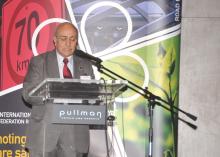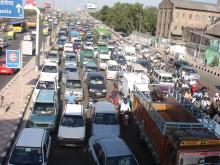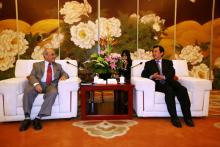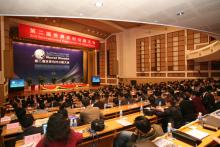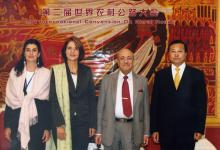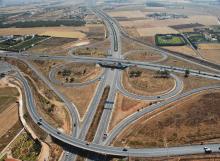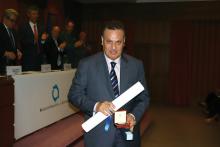We meet with Dr. Essam Sharaf, the former Prime Minister of Egypt, who has been honoured as IRF Personality of the Year for 2011 On 28 March, at a moving ceremony packed with IRF friends and delegates from all over the world, the IRF Personality of the Year Award for 2011 was formally presented to Dr. Essam Abdel-Aziz Sharaf.
Discerned annually since 1951, the Award honours individuals universally acknowledged as having made particularly inspirational contributions to the fields of road infrastructure and
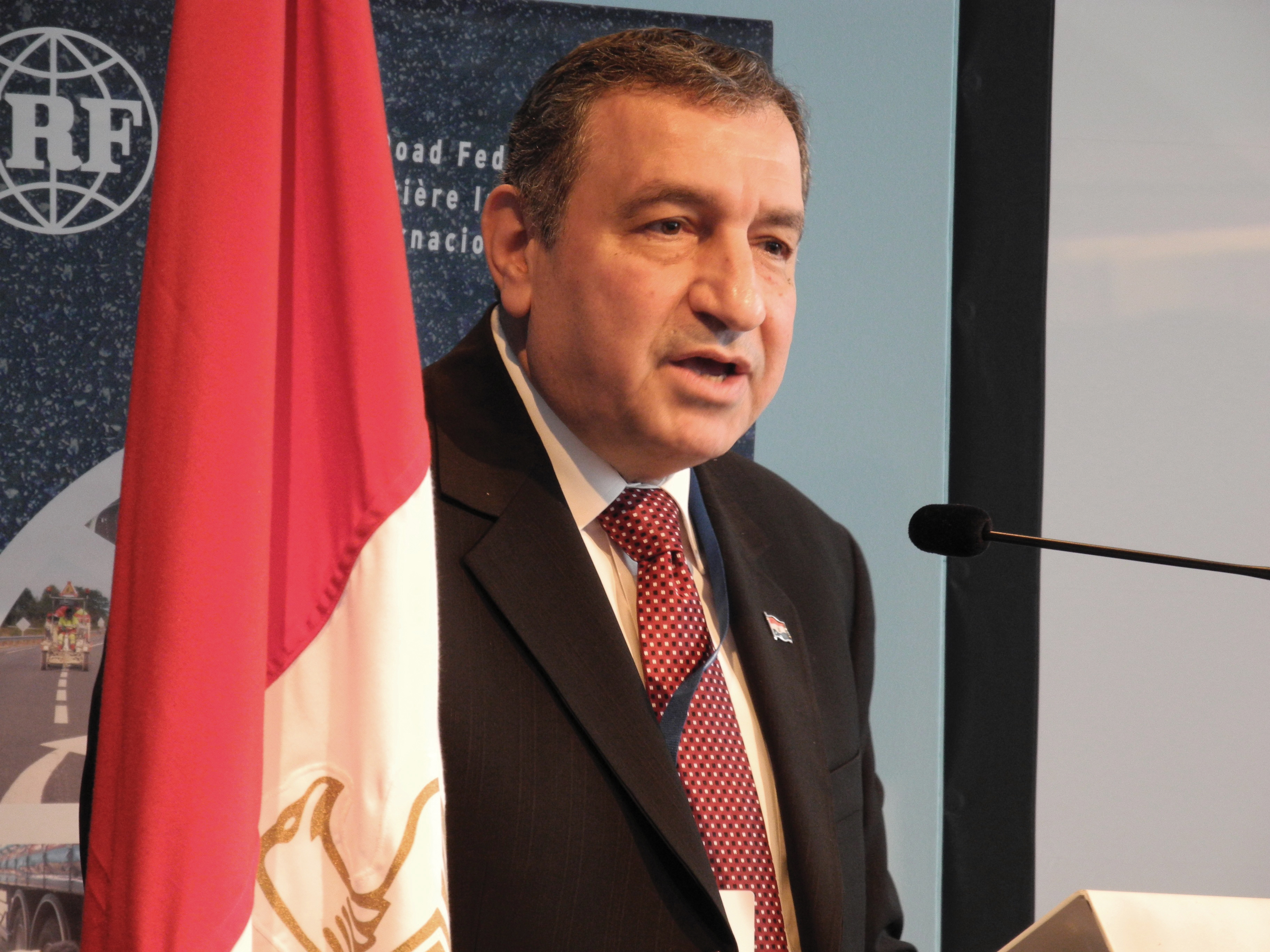
Dr. Essam Abdel-Aziz Sharaf
IRF Personality of the Year 2011
We meet with Dr. Essam Sharaf, the former Prime Minister of Egypt, who has been honoured as IRF Personality of the Year for 2011
On 28 March, at a moving ceremony packed withDiscerned annually since 1951, the Award honours individuals universally acknowledged as having made particularly inspirational contributions to the fields of road infrastructure and transport.
The IRF recognition is the latest in a long line of distinctions throughout the world bestowed on Dr. Sharaf who has notably served as his country’s Minister of Transport and also created the renowned Egypt Scientific Society, together with other eminent Egyptian scientists. In March 2011, he was invited by Egypt's governing Military Council to form an interim cabinet, which he led as Prime Minister until the end of that year.
Meeting with Dr. Sharaf after the ceremony we began by asking what the IRF Award meant to him when viewed against such a distinguished academic and political backdrop. He replied that the IRF Award was special in that it was discerned by fellow road industry professionals. “Such recognition by respected peers makes it a particular honour to be the recipient of this prestigious award from an organisation especially close to my heart”, he affirmed.
The IRF Community
In highlighting what IRF membership had brought him personally over the years, and why he would warmly recommend it to others, Dr. Sharaf emphasised the importance of the Federation’s global network, as well as its multidisciplinary mix.
IRF’s “rich blend of experience and expertise” has consistently corresponded to Dr. Sharaf’s needs and objectives. It is also something that, in his view, distinguishes IRF from other typical membership groups, which tend to be more one-dimensional. In contrast, IRF offers an exceptional diversity of ideas and connections by virtue of what Dr. Sharaf refers to as the ‘IRF Community’. Indeed, in his acceptance speech, Dr. Sharaf paid tribute to this community, which he said was daily “orchestrating the progress of the road transport industry, to enhance the human future through a better quality of life, and to fulfil the basic human rights of free movement and development”.
A new vision of ‘roading’
In this respect, Dr. Sharaf affirmed his wholehearted support for IRF’s emphasis on promoting roads that are ‘safe, smart and sustainable’.
On the environmental front, the industry was striving hard to overcome the sometimes negative connotations of the past through a new vision of ‘roading’ – one that embraces holistic strategies within and across modes so as to reduce the time and energy expended by users whilst opening new scope for economic savings.
All the best research over the last decade has been based on this, and it corresponds precisely with the vision of IRF – symbolised by flagship initiatives like the CHANGER Greenhouse Gas calculator - to encourage its members to explore the potential benefits that can be derived from building environmentally-friendly roads, developing alternative materials, techniques and technologies, and planning ‘forgiving roads’ that help eliminate accidents. The emphasis needs to be firmly on the human dimension – an approach that reflects and corresponds to human characteristics and needs. “Whereas, at one time, economics were the only yardstick”, he maintained, ”we are now entering a whole new era, where the social, environmental and even cultural dimensions of roads are being increasingly taken into account as part of the responsible decision-making process.”
Worldview
Dr. Sharaf has acquired a refreshing worldview in these respects. The common denominator linking his career as an eminent engineer with that of a distinguished Statesman may be that both disciplines focus on rebuilding the future – one in the literal sense and the other with a more visionary interpretation. This has made him particularly sensitive to the dangers of ill-conceived infrastructure development, and the controversies this has sometimes provoked, notably in the developing world context.
Indeed, Dr. Sharaf’s particular speciality lies in the field of transport asset management. From this perspective, he has been acutely aware of the undue weight that political decision-makers have sometimes tended to give to “prestige over functionality”. The function of an Interstate, for example, is completely different from that of an expressway or a local road, so it is an irresponsible waste of resources, in Dr. Sharaf’s view, to aspire to make all roads freeways. Rather there should be a balanced network with each component reflecting its specific function. “It’s the same as the circulatory system of the human anatomy,” he explained. “For the body to work efficiently, you need both large arteries and tiny systems of veins. The same applies to road and transportation networks; everything according to, and in keeping with, its specific function.”
Pre-requisites of progress
Awarded his PhD from Purdue University, Dr. Sharaf has spent a lot of time in the U.S. and greatly admires the research environment.
We should never overlook, however, the considerable scope for constructive and mutually beneficial two-way exchange of ideas and experience, including in the field of infrastructure development. Ultimately, the prerequisite of progress must be that it is tailored to human needs and corresponds to human aspirations. In this respect, mere ‘copy and paste’ solutions are often clearly inappropriate and counterproductive. For there to be a mutually-beneficial two-way exchange, the technological advances of one culture must be complemented by the rich heritage of societal wisdom, awareness and sensitivity we can acquire from the other.
For Dr. Sharaf, the value of civilisation lies in its sustainability. The Egyptian monuments have lasted thousands of years and are a tribute as well as a memorial to the advanced techniques employed. They symbolise in many ways the foundations of humanity, which must be strong and durable. Each generation must build its own underpinnings.
With respect to the challenges of our own times – notably by reference to the prevailing economic climate – Dr. Sharaf has been a pioneer of the modern and increasingly crucial discipline of maintenance management.
Preventive medicine
Dr. Sharaf is adamant that the criteria for infrastructure choices should be based on minimum life-cycle as opposed to minimum initial cost – and he has been involved in upwards of 30-40 studies that conclusively back up research undertaken by the
“In many ways, the problems may be assimilated to the common tendency not to visit the doctor for a routine check-up but instead wait until sickness takes hold,” he explained. “Or not to take our cars to the garage for periodic maintenance but wait until they have actually broken down. Viewed in this light, we are not in fact talking about ‘maintenance’ in the true sense, but rather ‘repair’. To be truly effective, maintenance should ideally be preventive in nature. In terms of saving costs the difference between ‘maintenance’ and ‘repair’ can be crucial.” Nuances like this explain why Dr. Sharaf always strives to give cultural perspective to his academic lectures.
Cultural underpinnings
Another example of how differing perceptions can make a huge difference to understanding and identifying solutions lies in the field of road safety: “In my part of the world, deaths and injuries from car accidents have traditionally tended to be put down to ‘destiny’. Rather than accepting this ‘destiny’, we need to instil realisation that road accidents are in fact more akin to diseases – moreover diseases that can be prevented.”
Whilst acknowledging that Cairo wasn’t exactly renowned for its safe driving, Dr. Sharaf explained that, again, many of the problems were largely cultural in origin. Increasingly in modern society there was a very large gap between private behaviour and public behaviour.
What has happened over time is that people have lost the sense of the ‘public’ – that what is owned by all should be respected by all, in a manner that reflects the values they apply in their own individual private lives. This particularly applies to large crowded mega-cities like Cairo, and explains the tendency for drivers to abandon all sense of civility – almost change character - once they leave their homes and embark on the public roads. “This is why I personally think we should follow the Japanese example and, instead of ‘driving licenses’, encourage people to acquire ‘traffic sharing licenses’, so as to better reflect the group responsibilities engaged.”
Teamwork & synergies
This led the discussion full circle back to how membership of IRF could help encourage the notion of teamwork, promote synergies and stimulate productive exchanges of best practice and experience. Dr. Sharaf felt that this was a fundamental attribute of IRF and went to the heart of what membership of the organisation was all about.
Only that morning, he had enjoyed extremely fruitful discussions with the Director General of
Clearly, Dr. Sharaf had no intention of resting on his laurels just yet, and IRF Geneva is fortunate to be able to benefit from the apparently ceaseless energy and ongoing dedication of this distinguished visionary in the field of roads and transport.
Certainly, the lessons and legacy of the eminent teachers who have marked and guided his career, are reflected in the patience, courtesy and quiet spoken authority of an inspirational man, to whom IRF and the people of Egypt both owe an immense debt of gratitude.

